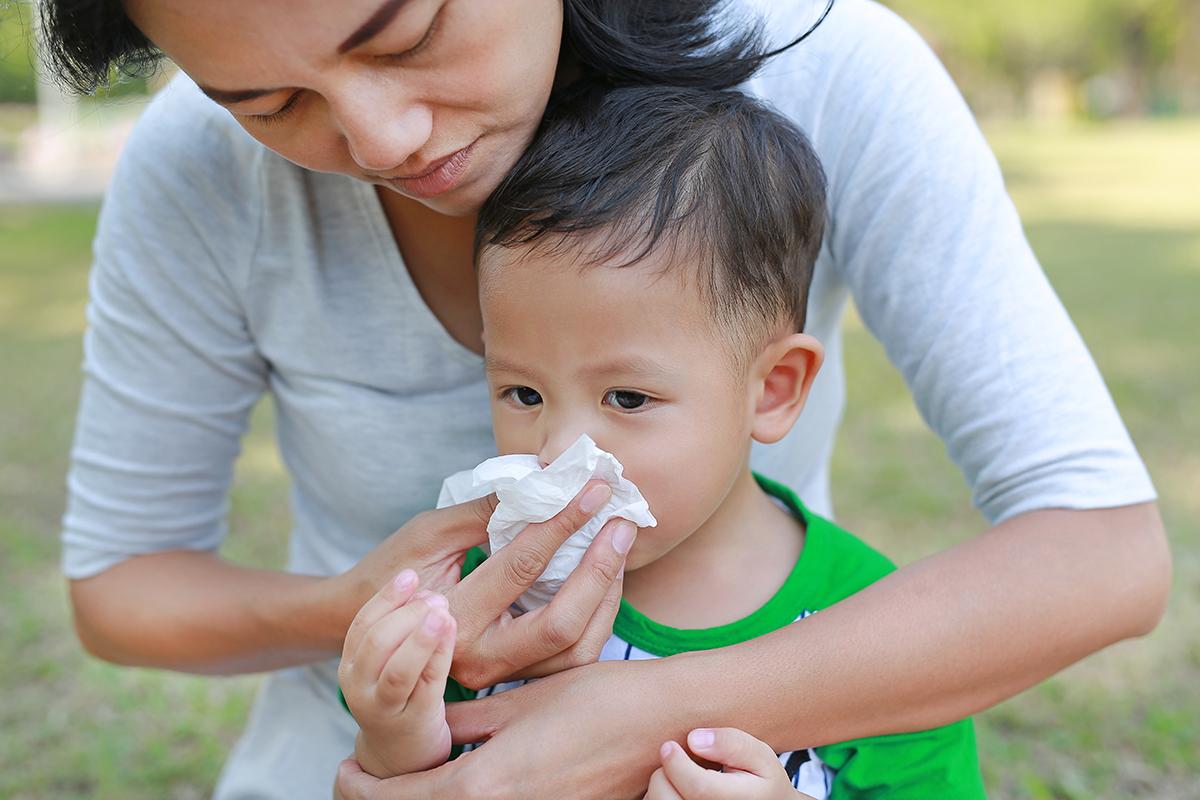Sponsored by Children’s Mercy Wichita.
 Top 6 Mistakes Parents Make When It Comes to Spring Allergies
Top 6 Mistakes Parents Make When It Comes to Spring Allergies
This winter was long and cold, but we’re finally starting to see signs of spring! With warmer temperatures comes another, less exciting season: allergy season. If your kids battle seasonal allergies, here are six common mistakes to avoid, so the whole family can enjoy springtime!
- Waiting too long to start allergy medication. If your child has seasonal allergies, be proactive. Start over-the-counter medications as soon as possible. We also recommend nasal steroids which may take a week or so to achieve effect, which is why these medications should be started early before the season begins.
- Too much outdoor time. We get it – we’re eager to get outside, too. But, for kiddos who struggle with seasonal allergies, too much outdoor time can worsen symptoms. If they are prone to seasonal allergies, ensure your child starts medication before spending extended periods outside. Limit outdoor play on windy days when pollen counts are higher. After outdoor activities, have them change clothes and take a bath to reduce pollen spread indoors.
- Airing out the house. It’s temping to crack the windows and let in the fresh air, but this can bring pollen you’re trying to avoid indoors. Keep windows and doors closed, even if it means running the AC earlier than usual. If you want to air out the house, do so early in the morning when pollen counts are lower. You should also change air filters regularly to prevent pollen from circulating indoors.
- Forgetting furry friends. Do you have pets? They are big culprits of bringing pollen indoors. Wipe them down when they come inside and bathe them weekly to minimize pollen spread.
- Mistaking allergies for a cold. Allergies and cold symptoms may look alike, but there are differences. Colds are more common from October to April and last about a week, with symptoms like low-grade fevers, aches, sore throats and congestion. Allergies are more common from March to September and last for weeks, with symptoms like itchy, stuffy or runny noses, sneezing and itchy, watery eyes. If unsure, consult your primary care provider.
- Not knowing your pollens. Identifying specific pollen allergies can be challenging, especially if you don’t know which ones affect your child. Allergy testing, which involves a simple skin or blood test, can help determine which pollens cause trouble. Knowing this can help you manage your child’s allergies more effectively.
For more help treating your child’s seasonal allergies, contact your primary care provider. They may refer you to an allergist for further testing and treatment options. Taking these steps can help both you and your child breathe easier this spring.

Children’s Mercy Wichita offers a child-friendly environment to provide families access to pediatric specialty care that otherwise might not be available without traveling out of the community including Cardiology, Endocrinology, Nephrology, Hepatology, Neurosurgery, Plastic Surgery and more.
 Bridgette L. Jones, MD MS holds a faculty appointment as Professor of Pediatrics at the University of Missouri-Kansas City School of Medicine (UMKCSOM) in the divisions of Allergy/Asthma/Immunology and Pediatric Clinical Pharmacology, Toxicology and Therapeutic Innovation and at Children’s Mercy and the Marion Merrell Dow Chair/ Missouri Chair in Pediatric Clinical Pharmacology at Children’s Mercy Hospital. She is a clinician scientist with a focus in therapeutics and interventions to improve the lives of children with asthma and is particularly interested in addressing asthma disparities. She holds funding thru the National Institutes of Health via multiple sources and has also received other extramural and intramural resources to support her work.
Bridgette L. Jones, MD MS holds a faculty appointment as Professor of Pediatrics at the University of Missouri-Kansas City School of Medicine (UMKCSOM) in the divisions of Allergy/Asthma/Immunology and Pediatric Clinical Pharmacology, Toxicology and Therapeutic Innovation and at Children’s Mercy and the Marion Merrell Dow Chair/ Missouri Chair in Pediatric Clinical Pharmacology at Children’s Mercy Hospital. She is a clinician scientist with a focus in therapeutics and interventions to improve the lives of children with asthma and is particularly interested in addressing asthma disparities. She holds funding thru the National Institutes of Health via multiple sources and has also received other extramural and intramural resources to support her work.
At the UMKCSOM she serves as the Assistant Academic Dean of Student Affairs. Nationally, Dr. Jones is the immediate past Chair of the American Academy of Pediatrics (AAP) Committee on Drugs and the immediate past chair of the American Academy of Allergy Asthma Immunology’s Asthma Cough Diagnosis and Treatment Committee. She is an editorial board member of the Journal of Allergy Asthma and Clinical Immunology in Practice. She also serves on the Food and Drug Administration Pediatric Advisory Committee and previously served on the National Institutes of Health Task Force on Research Specific to Pregnant Women and Lactating Women. She is wife to Rafiq and mother to Lola and Nora.















